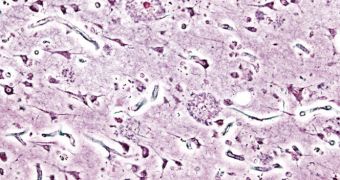Researchers found a direct correlation between getting sufficient amounts of vitamin D and a reduced risk of developing Alzheimer's disease, a neurodegenerative disorder that is affecting more and more seniors across the world.
In the new investigation, investigators tested the protective properties of vitamin D on unsuspecting lab mice, and determined that the chemical can work alongside transporter proteins in the blood-brain barrier for preventing the buildup of amyloid beta peptides in the human brain.
This type of buildup is one of the most well-known hallmarks of the condition. Experts at the Tohoku University hypothesize that a lower chance of increased amyloid concentrations leads directly to a lower chance for a person to develop Alzheimer's.
Details of the new work appear in the latest issue of the open-access journal Fluids and Barriers of the CNS, which is edited and published by BioMed Central. The study takes a closer look at how amyloid beta is removed from the brain.
It would appear that this process is dependent on amounts of vitamin D available for use, as well as on the alterations that age produces in BB transporter proteins. The latter are responsible for moving amyloid beta in and out of the brain.
Previous investigations have already linked reduced concentrations of vitamin D to memory and cognition declines, especially in old age. As such, the new research builds up on past studies, taking them a step further.
Experimentally, the Japanese research team demonstrated that it's possible to increase the rate at which amyloid beta is removed from the brain by injecting the test mice with moderate amounts of vitamin D.
“Vitamin D appears to increase transport of amyloid beta across the blood brain barrier by regulating protein expression, via the vitamin D receptor, and also by regulating cell signaling via the MEK pathway,” team leader and TU professor Tetsuya Terasaki explains.
“These results lead the way towards new therapeutic targets in the search for prevention of Alzheimer’s disease,” the expert goes on to say, quoted by PsychCentral.
“While increased production of transporter proteins at the blood CSF barrier may help amyloid beta removal from the older brain, production of these proteins eventually fails,” comments Gerald Silverberg.
“This failure may be an important event in brain function as we age and for people with Alzheimer’s disease,” concludes the expert, who is based at the United Nations University.

 14 DAY TRIAL //
14 DAY TRIAL //